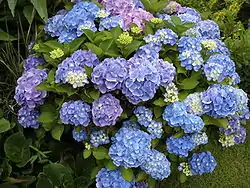紫陽花
Chinese
purple; violet; imperial purple; violet; imperial; palace | positive (electric.); sun; male | flower; blossom; to spend flower; blossom; to spend; fancy pattern | ||
|---|---|---|---|---|
| trad. (紫陽花) | 紫 | 陽 | 花 | |
| simp. (紫阳花) | 紫 | 阳 | 花 | |
Pronunciation
Noun
紫陽花
- Hydrangea macrophylla
Japanese
Etymology 1

| Kanji in this term | ||
|---|---|---|
| 紫 | 陽 | 花 |
| あじさい | ||
| Grade: S | Grade: 3 | Grade: 1 |
| jukujikun | ||
/adisawi/ → /ad͡ʑisai/
From Old Japanese. Recorded in the Man'yōshū of c. 759 CE with the phonetic man'yōgana spellings 味狭藍 (adisawi)[1] and 安治佐為 (adisawi), [2], and in the Wamyō Ruijushō dictionary of 938 CE with the phonetic spelling 阿豆佐為 (adusawi, atusawi).
Ultimate derivation unknown. Some sources[3] suggest that this comes from 集真藍 (adi sa-awi, literally “gathering + pure indigo”). However, this is problematic phonetically, as there is no evidence for any classical or ancient verb 集 (adu, modern azu) that would conjugate to adi (modern aji). The closest with this meaning would be 厚 (atsu), stem of the adjective 厚い (atsui, “thick; packed together”) and root of the classical verb 集む (atsumu, “to gather together”), modern 集める (atsumeru, transitive) and 集まる (atsumaru, intransitive), and this atu (modern atsu) never showed signs of voicing to adu (modern azu), let alone shifting the final vowel from -u to -i. This theory is also problematic semantically, as the hydrangea's color range never includes colors as dark as pure indigo.
Alternatively, the initial adi may be from 味 (ancient adi, modern aji; literally “flavor”), also used as an adjective referring to something good, preferable, or favorable. The sawi may be from -s- as an ancient possessive infix (see also 春雨 (harusame, “spring rain”), 真っ青 (massao, “pure blue, really blue”), 荒稲 (arashine, “unhulled rice”)) and awi from 藍 (ancient awi, modern ai; “indigo”, also used in some contexts to simply mean “blue”).
The spelling is borrowed from Chinese 紫陽花, literally meaning “purple sun flower”, and is an example of jukujikun (熟字訓).
Pronunciation
- (Tokyo) あじさい [àjísáí] (Heiban – [0])[4]
- (Tokyo) あじさい [àjíꜜsàì] (Nakadaka – [2])[4]
- IPA(key): [a̠ʑisa̠i]
Noun
紫陽花 • (ajisai) ←あぢさゐ (adisawi)?
- hydrangea, especially the bigleaf hydrangea (Hydrangea macrophylla)
- 1310, Fuboku Wakashō (book 9, poem 3355)
- 下野や籬にまじる紫陽花の四葩に見れば八重にこそ咲け
- shimotsuke ya magaki ni majiru ajisai no yohira ni mireba yae ni koso sake
- (please add an English translation of this example)
- 下野や籬にまじる紫陽花の四葩に見れば八重にこそ咲け
- 1310, Fuboku Wakashō (book 9, poem 3355)
Usage notes
As with many terms that name organisms, this term is often spelled in katakana, especially in biological contexts (where katakana is customary), as アジサイ.
Synonyms
- 七変化 (shichihenge), 七変化 (nanahenge)
- 四葩 (yohira)
Derived terms
- アジサイ科 (ajisai-ka, “Hydrangeaceae”)
- 額紫陽花 (gaku ajisai, “lacecap hydrangea”)
- 沢紫陽花 (sawa ajisai), 山紫陽花 (yama ajisai, “tea of heaven”)
- 西洋紫陽花 (seiyō ajisai, “Western hydrangea”)
Proper noun
紫陽花 • (Ajisai)
- a female given name
Etymology 2
| Kanji in this term | ||
|---|---|---|
| 紫 | 陽 | 花 |
| し Grade: S | よう Grade: 3 | か Grade: 1 |
| on’yomi | kan’on | |
/sijaukwa/ → /ɕijɔːkwa/ → /ɕijoːka/
The reading based on the 音読み (on'yomi) of the kanji spelling, itself borrowed from Chinese 紫陽花.
Pronunciation
- (Tokyo) しよーか [shìyóꜜòkà] (Nakadaka – [2])[4]
- IPA(key): [ɕijo̞ːka̠]
Noun
紫陽花 • (shiyōka) ←しやうくわ (syaukwa)?
- hydrangea
Etymology 3
Other various nanori readings.
Proper noun
紫陽花 • (Shōko)
- a female given name
紫陽花 • (Shiyoka)
- a female given name
紫陽花 • (Haruka)
- a female given name
References
- c. 759, Man'yōshū (book 4, poem 773), text here
- c. 759, Man'yōshū (book 20, poem 4448), text here
- Taketomi Yamamoto, 1981, アジサイの話 (Ajisai no Hanashi, “The Story of the Hydrangea”, in Japanese), Tōkyō, Yasaka Shobō, →ISBN
- 2006, 大辞林 (Daijirin), Third Edition (in Japanese), Tōkyō: Sanseidō, →ISBN
Further reading
- Etymology entry for 紫陽花 (ajisai) on Gogen-Yurai Jiten (Etymology and Origin Dictionary; in Japanese): http://gogen-allguide.com/a/ajisai.html
- Etymology entry for 紫陽花 (ajisai) on Yurai-Gogen Jiten (Origin and Etymology Dictionary; in Japanese): http://yain.jp/i/紫陽花